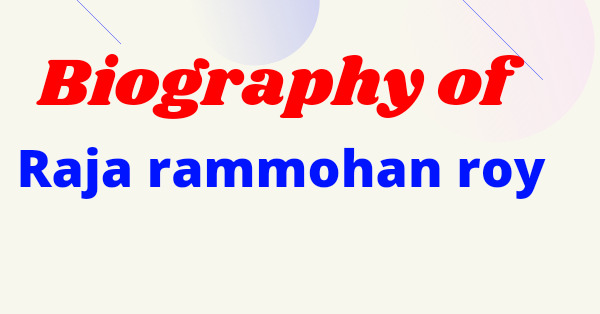Born, teenage and education life of Raja rammohan roy:-
Raja Rammohan Roy was born in 1772 in Hooghly district of Bengal into an orthodox Brahmin family. His father Ramakanta Roy and mother Phulthakurani were religious and ideal persons, Therefore, they had influenced him a lot in his early life. But he had a different bent of mind and developed his personality in his own way.He received his education on Persian and Arabic in Patna and Sanskrit in Banaras. About Buddhism, he had learned in Tibet. He also got a scope to learn Hebrew, Greek, Latin and English. This ultimately opened a vast opportunity for him not only to learn different important languages of the World but also the great literatures and cultures of important nations and communities of the World. He could gain in-depth knowledge about important religions such as Hinduism, Islam, Christianity and Buddhism and their scriptures. He studied Islamic metaphysics and other masterpieces of Sufi poets.He also studied about Christian doctrine of Trinity and Hindu idolatry, ritualism and formalism. This led him to be liberal in outlook and rational in approach. In his teens, at the age of fifteen only, Raja Rammohan Roy revolted against idol worship and religious observances and about it wrote a pamphlet in Bengali. This stirred the sentiment of his orthodox parents and he was expelled from the family. For a few years, he served under the British East India Company and Bengal Civil Service. In 1814, he settled down in Calcutta and devoted his life and time for the peace, progress and happiness of the entire human race.
Social movement
Raja Rammohan Roy was the champion of the Renaissance Movement in Bengal. In 1815, the Atmiya Sabha or the spiritual society was founded by Raja rammohan roy.He fought for abolition of the irrational practice of ‘Sati’. After a long struggle he was successful. Because of his honest efforts the then governor-general of india lord william bentinck abolished sati in 1829. Most important point is that in 1828,Brahmo samaj or the congregation of Absolute was founded by raja rammohan roy.
This he did to worship the Eternal Being or the Supreme Soul. This was a device of liberalising Hinduism and making it responsive to all the forces of modern World. His Brahmo Samaj aimed at establishing a universal religion and he invited all to worship the supreme Being irrespective of caste, colour, creed, faith and community. Rammohan Roy had the privilege of being titled ‘Raja’ and appointed the ambassador by Mughal Emperor Akbar II. He was to put forth the grievances the empire before king George IV of England. In 1830, he sailed for England to present the effects and obstacles of Sati Abolition Act and to protest against and curb all possible efforts of orthodox Indians to repractise Sati. During his stay in England, he met the great utilitarian philosopher Jermy Bentham who had influenced him a lot. He also had the opportunity to meet Robert Owen, the father of British socialism.The latter had also inspired Rammohan Roy to a great extent. Rammohan Roy was fortunate enough to see the passage of first Reforms Act while he was in England. He treated it as the victory of right, liberty and justice. Raja rammohan was died in bristol on 27 september 1833.Before he died, he had to his credit a lot of works written in Bengali, Persian and Arabic. Some of them are Tuhfat-ul-Mawahhidin, Vedanta Grantha, Vedantasara, Kenopanishads, Isopanishads, Kathopanishads, Mandukyopanishad, The Precepts of Jesus-the Guide of peace and happiness.
Raja rammohan was famous for :-
RAJA RAMMOHAN ROY was an iconoclast and the harbinger of a new era in India. Raja rammohan roy is regarded as the father of Indian Renaissance as well as the prophet of the Indian Nation. He was the first great social and religious reformer of Modern India. He was the central figure in the cultural awakening of India and was a Messiah for the Indian masses. He was the native liberator for his compatriots. He released India from the Dark Age’ and flooded it with new light and life. He was the inaugurator of the Modern Age in India and the pioneer of contemporary Indian humanism. He believed in the fundamental principle-‘fatherhood of God and brotherhood of man’ which Kabir and Nanak had preached earlier. He was a believer of monotheism or the existence of one and the only one God. He was a liberal Hindu and was never dogmatic. He strongly upheld a rational and universal religion and rejected idolatry, dogmas, religious ceremonies, ritualism and formalism.He was quite justified in thinking that the political regeneration of India could only be brought about through socio-religious reforms. Religious reform was necessary because social life was based on the principles of religion

